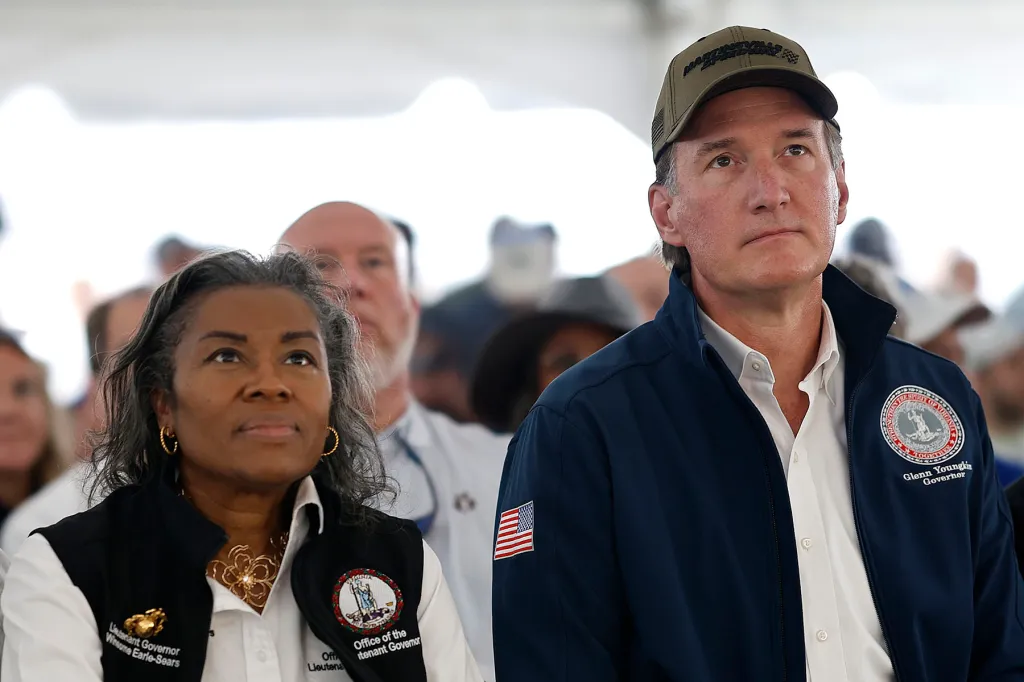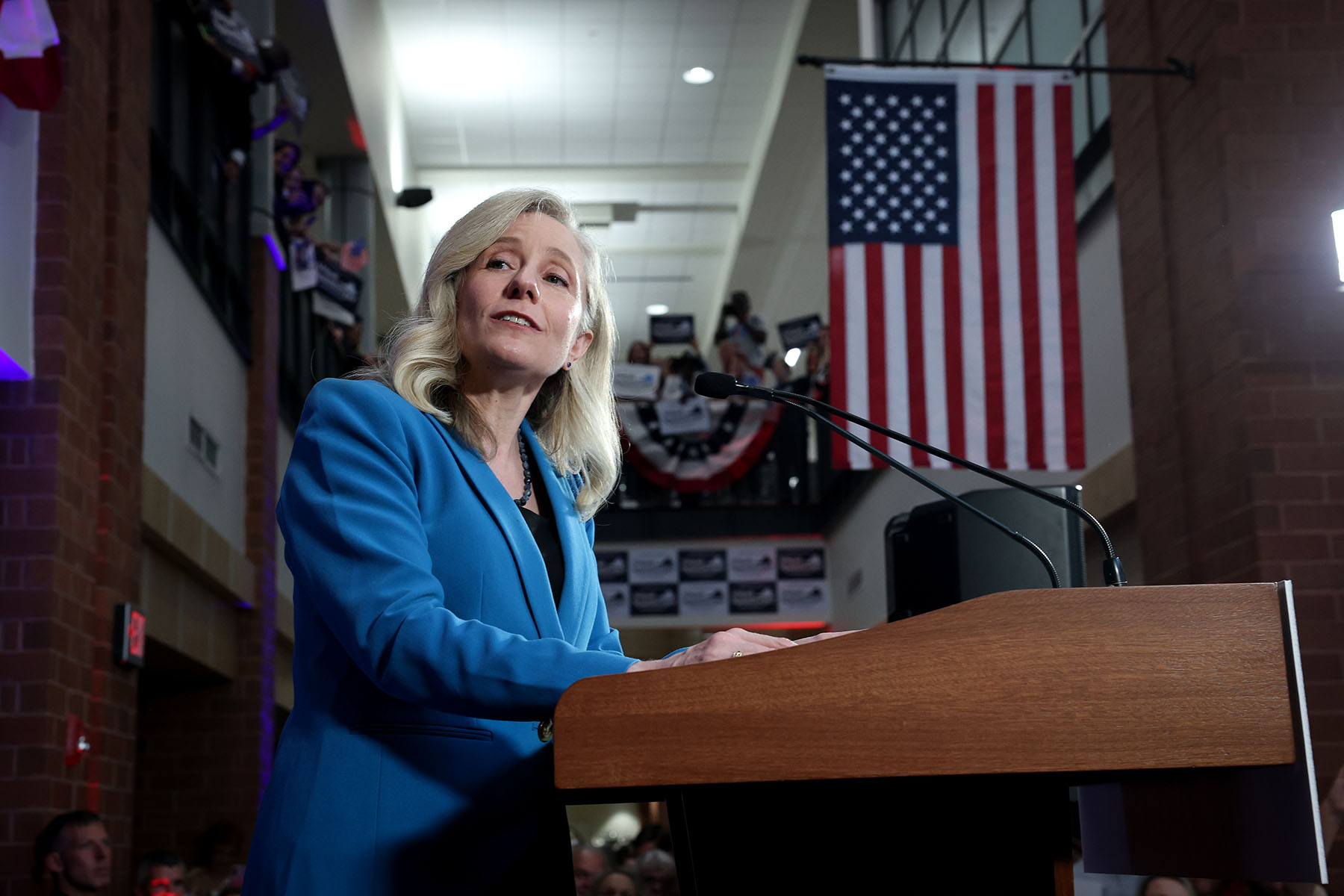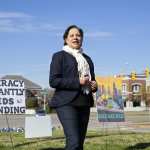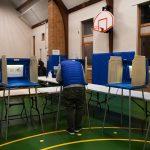Virginia’s primaries on Tuesday will lock in the ballot in one of the few states with competitive elections this November. But the top of the ticket is already set: Two women — former Rep. Abigail Spanberger and Republican Lt. Gov. Winsome Earle-Sears — will fight for the governorship and lead their parties in a bid for control of state government and the state’s lower chamber.
Spanberger will lead Democrats, with a message that has focused on affordability and the cost of living, as well as on leading the state through the “chaos” of a second Trump administration.
Earle-Sears, who in 2021 became the first woman of color elected statewide in Virginia, is closely aligned with the Trump administration’s agenda — running to lower costs by cutting taxes and government spending and vowing to keep transgender women out of women’s sports and women-only spaces.
The two-women contest for the governor’s mansion is poised to give Virginia its first woman governor. If she wins, Earle-Sears would become the nation’s first Black woman governor.

As of 11 p.m. Eastern time Tuesday, Decision Desk HQ showed state Sen. Ghazala Hashmi in the lead in the Democrats’ race for lieutenant governor and Jay Jones with a slight edge over Commonwealth’s Attorney Shannon Taylor for the party’s attorney general nod.
Virginia’s elections will be an important test of voters’ temperature in the first set of statewide elections since President Donald Trump returned to the White House. Earle-Sears will also be fighting against the state’s long-established pattern of handing power to the party that isn’t in control of the White House.
Voters in Virginia and New Jersey will head to the polls in November to elect new governors in states that delivered reliable victories for Democratic presidential candidates, but where Republicans see an opening for an off-year election victory given Trump’s gains in both states compared with his 2020 performance.
In both states, Democrats’ tickets will be led by women, whose messaging and vote-getting strategy will shape the party’s stance heading into the 2026 midterms.
In Virginia, Democrats are vying for full control of state government four years after voters gave Republicans all three statewide offices and both chambers of the legislature. Democrats took control of the Senate two years ago in an election heavily focused on reproductive rights. Virginia remains the last state in the South that hasn’t restricted abortion since the fall of Roe v. Wade.
The election could also decide the fate of three constitutional amendments that need a second vote of approval from the legislature to get on the 2026 ballot. The measures would enshrine the right to abortion and other forms of reproductive health care; protect marriage equality if the U.S. Supreme Court were to overturn the 2015 Obergefell decision; and automatically restore voting rights to people with felony convictions once they are released from prison.
Earle-Sears has stated her “moral opposition” to both abortion and marriage equality.
The Republican’s campaign has focused on reducing the cost of living by lowering taxes, reducing “wasteful government spending” and cutting government regulations. The lieutenant governor is also proposing to bring what she calls a “tough on crime” agenda to Virginia, to expand school-choice options for parents in the state and to “protect” women’s sports and women-only spaces by restricting access to transgender women.
“Winsome fully supports the Trump administration’s action to restore fairness and safety to women’s sports,” her campaign website says.
Spanberger’s campaign is also focused on affordability, and has unveiled plans for lowering healthcare, housing and energy costs through state policy. That includes things like increasing funding for public health clinics, and incentivising new housing construction by giving localities more flexibility from state regulations.
Cuts to the federal workforce by the so-called Department of Government Efficiency have rattled Virginia, home to a large swath of federal workers from Northern Virginia to Hampton Roads.
“Virginia is a state that is, in many ways, uniquely or profoundly impacted by much of what is happening at the federal level,” Spanberger said in an interview. “I’m running to address the affordability crisis, to put us on the path to having the best public schools in the country, to ensure that Virginia is a place that is welcoming, where housing is affordable. … But all of those discussions do happen on a broader landscape — so much of what Virginia is and has made our economy strong is to some degree under attack by the efforts of this administration.”
Spanberger’s and Earle-Sears’ nominations became all but assured in the spring; Democrats coalesced around Spanberger while Earle-Sears’ challengers failed to get enough signatures to make it onto the ballot.
The statewide Republican ticket led by Earle-Sears was set without a competitive primary. The three candidates haven’t made any joint appearances, and Earle-Sears’ own campaign has no public schedule yet. Notably, Republicans’ candidate to replace Earle-Sears, John Reid, is the first out gay candidate for statewide office in Virginia.
Reid faced pressure, including from Republican Gov. Glenn Younkin, who is term-limited, to withdraw from the race over allegations that he shared explicit photos of men from a social media account. Reid denied those claims, and argued in a lengthy video posted to social media that the effort to kick him off the ballot was based on discrimination against his sexual orientation. Reid vowed to stay in the race.






